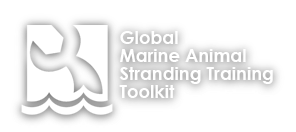Small Cetacean strandings
This module covers both live and dead small cetacean stranding response best practices. The common training objectives ( #1 – #5) should be completed before starting with this training modules. Small cetaceans include most dolphins species (such as common dolphins, bottlenose dolphins, spinner dolphins, humpback dolphins) and porpoises. Live larger dolphin species such as pilot whales and killer whales, may require a different approach and more resources to respond and rescue.
The presentation provides a comprehensive step-by-step response effort and may not necessarily apply to all situations or be feasible to implement due to capacity or resource issues. We encourage trainers and responders to adapt the presentations to your audience and circumstance. Similarly, it may not be possible to collect all possible data from a stranded animal. Therefore, responders should make decisions about data collection based on operating conditions but focus on maximizing the collection of critical animal-related information, including photographs.



